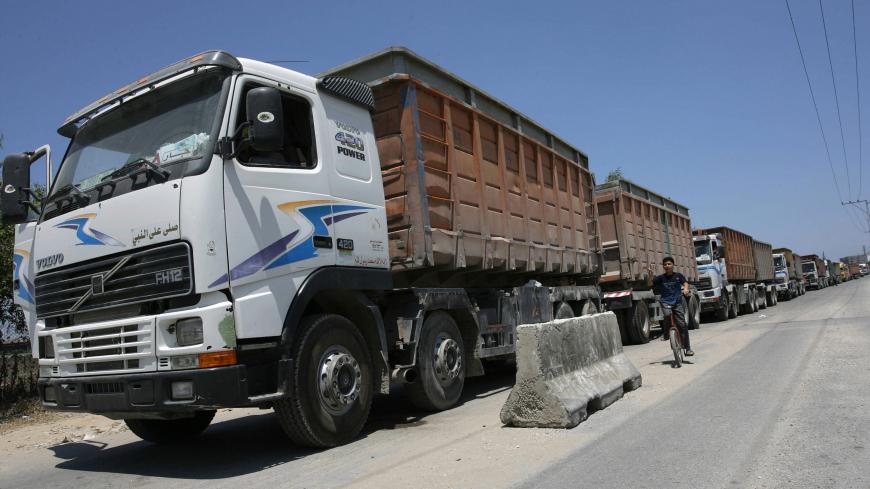GAZA CITY, Gaza Strip — An industrial zone funded by Qatar is set to be established east of Gaza City, by the Karni crossing. The zone is projected to provide jobs to 5,000 Palestinian workers from the Gaza Strip, Israel’s Walla News reported July 4.
The project was discussed and approved during a security Cabinet meeting led by Israeli Prime Minister Benjamin Netanyahu and several high-ranking security officials in May.
The industrial zone is based on the terms of the truce talks between Hamas and Israel, which have been mediated by Egypt, Qatar and the United Nations since October 2018. According to Yedioth Ahronoth, Israeli and Qatari approval of the project was delayed because of respective bureaucracies.
Now that the zone has been approved by Israel and guaranteed financing by Qatar, it is expected to start operation at any moment. Israel wants to absorb Hamas' anger after the Israeli army killed one of its members in Gaza on July 12, with Hamas threatening retaliation.
However, Walla News added that the project has been hindered by the fact that Hamas does not want Israel to transfer the Qatari grant funds intended for Gaza's impoverished citizens and public employees to infrastructure projects.
On May 6, the emir of Qatar, Sheikh Tamim bin Hamad Al Thani, gave Palestinians in the Gaza Strip and the West Bank a $480 million grant. Of that amount, $36 million is to be allocated to Gaza's poor, with 60,000 families receiving $100 stipends over six months. Hamas wants $30 million of the Qatari funds to be used to pay the salaries of public employees, with $5 million paid each month over the course of six months. The rest of the Qatari donation will be used to buy fuel to run Gaza’s power plant and to fund infrastructure projects.
A Qatari official, speaking on condition of anonymity, told Al-Monitor that Qatar had indeed agreed to finance the industrial zone east of Gaza City following talks with the Israelis in May and June.
The official refused to give a precise date for the zone's implementation, stressing that the current focus is the establishment of a field hospital in the northern Gaza Strip. The industrial zone, he said, will be built in the closed area of the current industrial zone, east of Gaza, which Israel shut down for security reasons.
The source denied that Qatar's financing would come from the emir's funds, part of which is paid in monthly stipends for the poor in the Gaza Strip. He stressed that the funds for the industrial zone have nothing to do with the emir’s funds.
Lebanese al-Akhbar newspaper reported July 10 that Egyptian intelligence had approved the Israeli proposal to use Qatari funds to finance infrastructure projects.
Hamas leader Yahya Moussa told Al-Monitor, “We welcome any support aimed at relieving the Palestinian people, especially the revival and operation of the disrupted part of the industrial zone east of the Gaza Strip.”
“The revival of the zone was one of the items agreed upon between Hamas and the mediators during the truce talks that have been going on since October 2018," he said. "But we cannot accept that this be done through the funds that are allocated to the poor. The investment in the zone should be done through the funds of businessmen.”
In May, Qatar provided $100 monthly stipends to 108,000 poor families in the Gaza Strip. In June, it decreased the number of beneficiaries to 60,000 upon Israel's objection to certain recipients, arguing that they were members of Hamas.
Abel Rahim Abu Foda, the executive director of the Palestinian Industrial Estates and Free Zone Authority (PIEFZA), told Al-Monitor that the main obstacle to the establishment of this new zone and any other zone is Israel's refusal to export products produced in the Gaza Strip.
“The few remaining Palestinian factories that are still operating in the industrial zone east of Gaza cannot export most of their products, including beverages, furniture, clothing and food products,” Abu Foda said.
He pointed out that Gaza's export rate has fallen to record levels since the Israeli blockade began in 2007.
Abu Foda welcomed any national or international funding for the establishment of industrial and economic sectors in the Gaza Strip to help bolster its economy. He explained that only 33 factories are left, with an estimated value between $50 million and $60 million.
The industrial zone east of Gaza City was the first to be established in 1997, with the support of the US Agency for International Development. It used to cover an area of 500 dunums (123 acres) and contained 68 plants. In February 2011, Israel closed part of the zone, near the Karni crossing, for security reasons.
Maher Tabbaa, the director of public relations at the Gaza Chamber of Commerce, concurred with Abo Foda, saying that the problem is exporting the Palestinian products abroad. Israel only allows a few products to be exported through the Kerem Shalom crossing, south of Gaza, including furniture, fish, vegetables, plastic goods, ready-made clothes and other products. This costs the Palestinian traders double, as they have to bear the costs of transporting goods to the Kerem Shalom crossing, when they used to export them directly through the Karni crossing.
Before 2007, Palestinian traders in the Gaza Strip exported about 120 goods-laden trucks to Israel, Arab countries and Europe daily. After the blockade, they only export nine trucks of goods a day, and sometimes Israel bans exports altogether.
The biggest challenge for Palestinians remains the extent to which Israel allows them to import raw materials into the Gaza Strip and export what is produced through the industrial zone.








